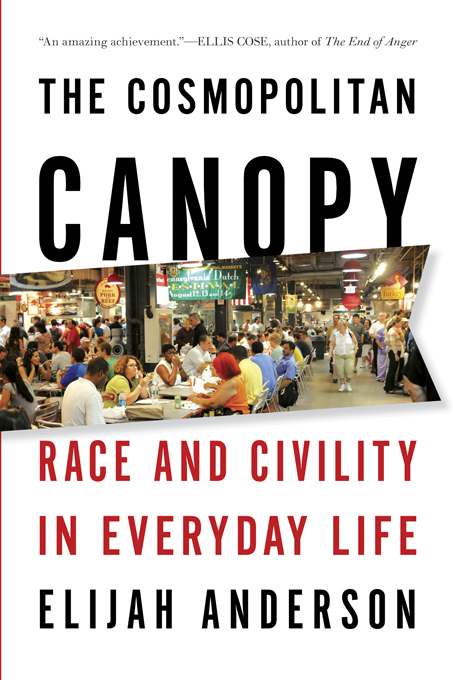
ALSO BY ELIJAH ANDERSON
Against the Wall: Poor, Young, Black, and Male
A Place on the Corner
Code of the Street: Decency, Violence, and the Moral Life of the Inner City
Streetwise: Race, Class, and Change in an Urban Community
The
COSMOPOLITAN
CANOPY
Race and Civility
in Everyday Life
ELIJAH ANDERSON
 W. W. Norton & Company New York London
W. W. Norton & Company New York London
More praise for
THE COSMOPOLITAN CANOPY
We know that the modern world-system has a major built-in contradiction. We profess loudly a normative universalism. But we practice deep racial and ethnic divides. How do we as individuals navigate this social anomaly? Elijah Anderson uncovers the ambiguous ways we do this in this exciting ethnography.
Immanuel Wallerstein, Yale University
Once I began reading this brilliant book I could not put it down. Anderson provides an incredibly rich narrative of the interactions of city dwellers from different segregated neighborhoodsghettos, ethnic enclaves, and suburbsin public places. By revealing hidden social and racial dynamics, Anderson explains not only the conditions that ease racial tensions and promote interracial harmony but those that reinforce traditional racial boundaries as well. This book is a must-read.
William Julius Wilson, Lewis P. and
Linda L. Geyser University Professor, Harvard University
Elijah Anderson has devoted his life to documenting the racial divide in inner-city America. In this new, artfully personal ethnography, he dares to hope for an expansion of the space for human civility, while confronting us soberly with the immense ongoing toll of racism in everyday relationships in our nation.
Philippe Bourgois, author of Righteous
Dopefiend and In Search of Respect: Selling Crack in El Barrio
Elijah Andersons The Cosmopolitan Canopy is an amazing achievement. His keenly observed and richly rendered portraits of life in Philadelphias public spaces consistently yield insights so original and so perceptive that they leave you saying, Wow.
Ellis Cose, author, The Rage of a
Privileged Class and The End of Anger
This is the most important book on race relations in many years. Elijah Anderson, skilled ethnographer of the black community, takes us behind the statistics into the scenes of everyday life. We witness front-stage performances of integration and backstage racial ethnocentrism, as well as the venues where interracial cosmopolitan civility is constructed. The Cosmopolitan Canopy is a report on todays African American elite that long updates E. Franklin Fraziers classic Black Bourgeoisie. It offers a gift for our pessimistic times: a book of realistic optimism.
Randall Collins, president,
American Sociological Association
Elijah Anderson is a master ethnographer. Field research
is a way of life for him, a medium through which, unceas-ingly, over the course of many years, he has courageously explored the innermost recesses of life in an American city,
especially the social worlds and the experiences of black Americans. Once again, in The Cosmopolitan Canopy, he moves from one area of Philadelphia to another, exploring the patterns of social interaction and behavior in various public places. Anderson calls these urban spaces cosmopolitan canopiesa concept likely to evoke lively, illuminating discussion.
Rene C. Fox, Annenberg Professor Emerita
of the Social Sciences, University of Pennsylvania
The Cosmopolitan Canopy is a richly detailed account of how the public spaces we all share can either separate or help bring us together. I strongly recommend it.
Marian Wright Edelman, president,
Childrens Defense Fund
A rich narrative.... Andersons observations are keen but not distant as he offers journal pages and interviews, showing his own full engagement in interactions with a cross section of Philadelphians. Anderson also offers singular insight into the social machinations of blacks in professional versus social settings. Fascinating sociology and people-watching at its profound best.
Vanessa Bush, Booklist
Anecdotes abound, and the author includes excerpts from his own journal of his perambulations and observations, giving his account immediacy and verisimilitude. The writing is generally crisp and clear, free of sociological jargon, and thus accessible to most readers.
Kirkus Reviews
Andersons nuanced treatment of the social dynamics of racial inequality and his precise observations (the politics of eye contact, for example),... offer immediate pleasure.
Publishers Weekly , starred review
Elijah Anderson... might be the nations leading people-watcher.
Dan Rodricks, Baltimore Sun
Yale sociologist Anderson is a skilled, experienced ethnographer of urban race relations, and his observations are insightful.... The sheer wealth of perception and shrewd commentary makes this book very accessible and i ntriguing for students and others interested in the state of U.S. race relations in the early 21st century.... Highly recommended.
W. Griswold, Choice
Philadelphia plays the starring role as Anderson shows how, in real life, we really do get alongwith overlapping canopies that combine to make a cosmopolis. A much-needed study of how boundaries disappear, assert themselves, and melt.
Herald Review
Best of all is the authors relaxed and inspiring enjoyment of the city as a place of constant surprise, a multiplicity of pleasures, and wonder-inducing urban spaces.
Frederic and Mary Ann Brussat, Spirituality Practice
Copyright 2011 by Elijah Anderson
All rights reserved
First published as a Norton paperback 2012
For information about permission to reproduce
selections from this book, write to Permissions,
W. W. Norton & Company, Inc.,
500 Fifth Avenue, New York, NY 10110
For information about special discounts for
bulk purchases, please contact W. W. Norton Special Sales
at specialsales@wwnorton.com or 800-233-4830
Frontispiece photograph by Elijah Anderson.
Map of Philadelphia created by Tom Gavin.
Book design by Dana Sloan
Production manager: Devon Zahn
Library of Congress Cataloging-in-Publication Data
Anderson, Elijah.
The cosmopolitan canopy : race and civility in
everyday life / Elijah Anderson 1st ed.
p. cm.
Includes bibliographical references and index.
ISBN 978-0-393-07163-4 (hardcover)
1. City and town lifePennsylvaniaPhiladelphia.
2. GentrificationPennsylvaniaPhiladelphia.
3. United StatesRace relations. 4. United StatesEthnic
relations. 5. African AmericansSocial conditions1975
I. Title.
HT153.A53 2011
307.760974811dc22 2010044411
ISBN 978-0-393-34051-8 pbk.
W. W. Norton & Company, Inc.
500 Fifth Avenue, New York, N.Y. 10110
www.wwnorton.com
W. W. Norton & Company Ltd.
Castle House, 75/76 Wells Street, London W1T 3QT
1 2 3 45 6 7 8 9 0
For my friend and teacher, Howie
aka Howard S. Becker
CONTENTS
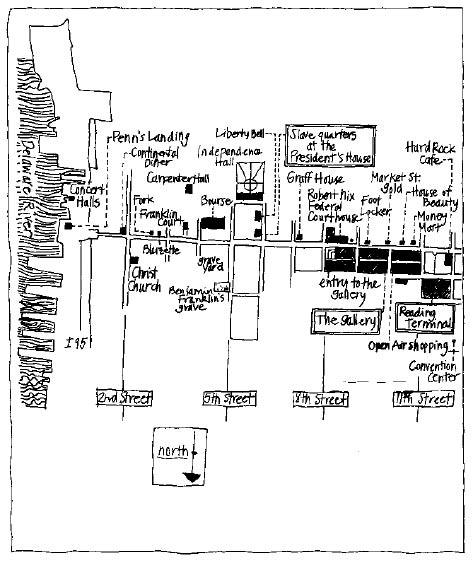
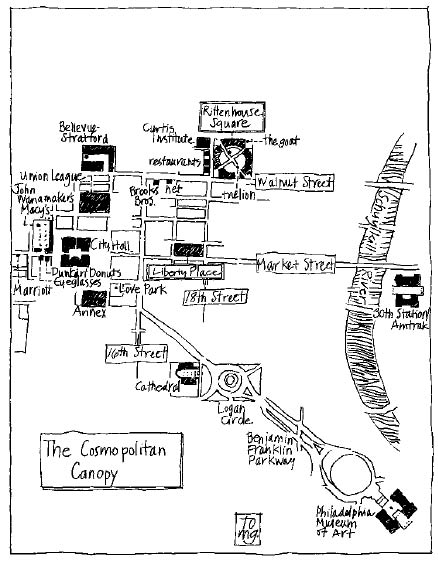
PREFACE
I have long been fascinated by the lived experience of race in America, especially through my home city of Philadelphia. How do ordinary people in this diverse city interact across and along racial lines? From early morning through late at night, downtown streets are crowded with an ever-changing kaleidoscope of people, not only rushing past one another in dizzying swirls but also mixing and mingling for a moment or two amid the busyness of everyday life. Working people, shoppers, commuters, students, tourists, pleasure seekers, municipal service employeeswhole hosts of strangers, a myriad of acquaintances, and intersecting groups of friendsall share public space, more or less peacefully. When and how do racial identities figure into these everyday encounters? When and how do city dwellers set aside their own and others particular racial and ethnic identities to communicate in more cosmopolitan ways? What conditions enable people in some urban places to consort with others with such civility? These questions arise as we observe public life in almost any contemporary American city.
Next page





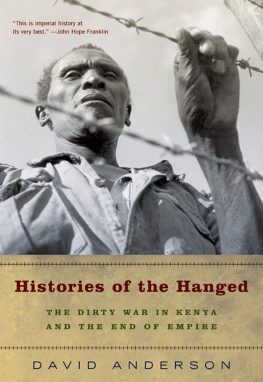
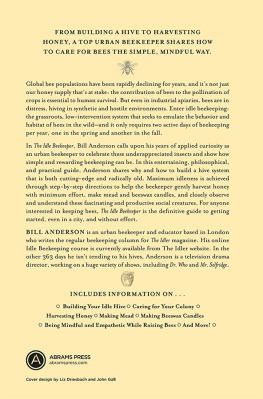



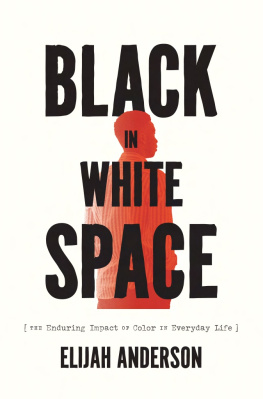
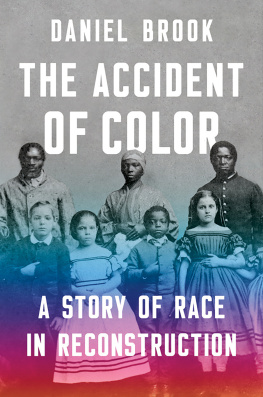
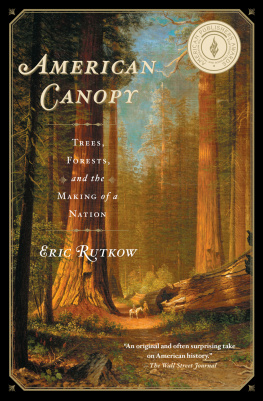


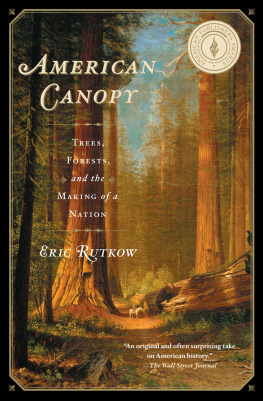
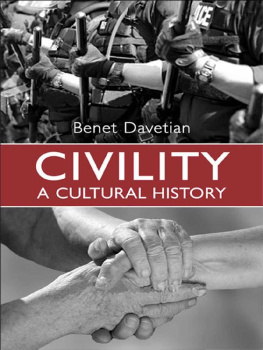
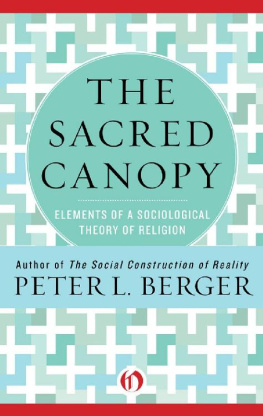

 W. W. Norton & Company New York London
W. W. Norton & Company New York London
